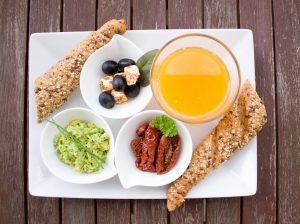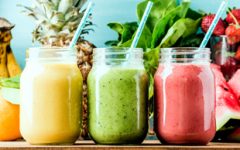
There are a lot of misconceptions about what is and what isn’t considered healthy eating and this has led to some really harmful diet types to emerge. From the 5 and 2 diet to juice detoxes, these diets can have a significant impact on your overall health.
The rise of social media hasn’t helped. When you scroll on Instagram, how many times have you seen an influencer/model advertise a bogus diet they “claim” has improved their life? Too many to count.
And the consequences of a distorted view of what healthy eating and dieting looks like can be tremendous.
So what is considered eating healthy? And do you even need to be on a diet?
At Beauty News, we felt it was our duty to refute toxic dieting BS. This is all based on government regulations and medical professional advice.
Here’s what you need to know to have a healthy relationship with eating and dieting.
How many calories should I be eating a day? Do calories even matter?

The amount of calories each person needs a day to maintain a healthy lifestyle differs based on the individual. There are many factors that go into determining how many calories you need everyday. Whilst the standard calorie consumption per day is 2000 for women and 2400 for men, the amount of exercise you do per week, as well as your metabolic rate are also important to consider. Although not a perfect measurement, calorie calculators can be useful to see how many calories your body consumes in a day, and how many calories you could be eating if you wanted to make changes to your diet. However, it has been accepted that eating less than 1000 calories a day can be detrimental to your health. The effects of too low calorie consumption can lead to a slower metabolism, decreased muscle mass, disrupts mood and can impact your fertility. Your body can also choose to store more fat since it goes into starvation mode.
What foods should I be eating?

If you have ever wondered what you should be eating daily, the Australian Dietary Guidelines are probably the best place to go to. The guidelines provide the basic framework of what Australians should be eating, and are based on scientific research and medical professionals.
They outline that adults should be eating 5 serves (75 grams is equal to one serve) of vegetables, 2 serves of fruit, 6 serves of grains/cereals, 2.5 serves of protein and 2.5 serves of dairy per day. Understandably, it can be difficult to achieve this in a day, but trying to attain as close to this as you can will help you lead a healthy lifestyle.
A 2017 survey found that 80% of adults do not eat enough fruit or vegetables so if you’re one of the millions that don’t eat enough, now might be the time to reassess your diet. If you want to know what this looks like, check out this article here. If you’re wanting to try and find a way to increase your fruit and veg intake in a tasty way, these recipes here could be really useful.
What about junk food?

Now when it comes to junk food, who doesn’t eat more than they should? From chocolate to cakes, chips, burgers and pizza, we all crave a bit of fatty, sugary goodness. It’s such a shame all of these delights are so unhealthy. The effects of high fat and sugar consumption are incredibly well documented. They are also highly addictive.
However, whilst we associate all these delicious foods as being the worst contributors of fat and sugar, sometimes foods marketed as “healthy” can be the secret main offenders. For example, granola bars, diet cookies and similar kinds of foods can often contain similar levels of sugar and fats as other junk foods.
But should we avoid all of these foods altogether? No. It’s ok to enjoy these types of food on occasion, but they should not be a part of an every day diet. So how often can you eat these foods? Although entirely up to you, if you want to cut back how often you eat these foods, you shouldn’t go cold turkey. Reduce your amount of junk food slowly to a point where you feel comfortable, and if you want some helpful tips check out the link here. There are also a lot of zero sugar substitutes that you can try to help you satisfy cravings as you try.
Who should I go to if I have concerns with my eating habits?

Your GP should be your first line of contact if you have any concerns with your eating habits. They can provide you with comprehensive information and can guide you if you need to make changes. From there, you may be referred to a nutritionist or dietician who can help you on what a healthy and realistic diet looks like. People you should not turn to include Instagram models and “fitness influencers”.
What to remember about eating healthy

Oftentimes, healthy eating is associated with weight/weight loss but that shouldn’t be the case. Whilst a good diet can lead to weight loss in some people, associating healthy eating in relation to your weight I’ve found is the wrong way to view it. All body types can be healthy as long as you are meeting nutritional requirements and don’t have any health issues such as high cholesterol and type 2 diabetes.
Have any other tips for eating healthy? Let us know in the comments.






















